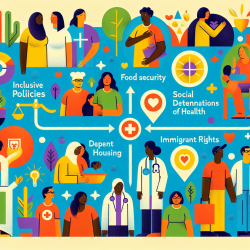In the realm of public health, understanding the social determinants that affect immigrant populations is crucial. The research article "A social determinants framework identifying state-level immigrant policies and their influence on health" provides a comprehensive analysis of how state-level policies impact the health and well-being of immigrants. This blog post aims to help practitioners improve their skills by implementing the outcomes of this research or encouraging further exploration into this vital topic.
The Framework: State-Level Immigrant Policies as Social Determinants of Health
The research highlights that while federal immigration laws set the stage, state-level policies create a varied landscape of rights and opportunities for immigrants based on their legal status. This framework identifies five key domains where state policies significantly impact immigrant health:
- Public Health and Welfare Benefits: Policies that extend or restrict access to healthcare services.
- Higher Education: Access to tuition equity and financial aid for undocumented students.
- Labor and Employment: Inclusion in employment protections and use of systems like E-Verify.
- Drivers' Licenses and Identification: Access to identification which impacts mobility and economic opportunities.
- Immigration Enforcement: State participation in federal programs like Secure Communities.
Research Findings: Policy Inclusiveness and Health Outcomes
The study found that states with higher proportions of foreign-born residents and Hispanic populations tend to have more inclusive policies. Conversely, states with a higher percentage of Republican voters often have more exclusive policies. These policy environments significantly affect immigrants' access to services, social inclusion, and overall stress levels.
This variation in policy inclusiveness suggests that practitioners need to consider the broader policy environment when assessing immigrant health outcomes. Understanding these dynamics can help practitioners advocate for more inclusive policies that promote better health outcomes for immigrants.
Practical Applications for Practitioners
Practitioners can leverage the insights from this research in several ways:
- Advocacy: Use data from the study to advocate for more inclusive state policies that support immigrant health.
- Cultural Competency Training: Enhance training programs to include information about how state policies impact immigrant communities differently.
- Community Engagement: Work with community organizations to raise awareness about available resources and rights under current state policies.
- Policy Analysis: Conduct further research into specific state policies and their direct impact on local immigrant populations.
The Importance of Ongoing Research
The research underscores the need for continuous examination of how state-level policies affect immigrant health. Practitioners are encouraged to engage in further research to explore new policy developments and their implications. By staying informed, practitioners can better serve immigrant communities and contribute to shaping a more equitable policy landscape.
To read the original research paper, please follow this link: A social determinants framework identifying state-level immigrant policies and their influence on health.










